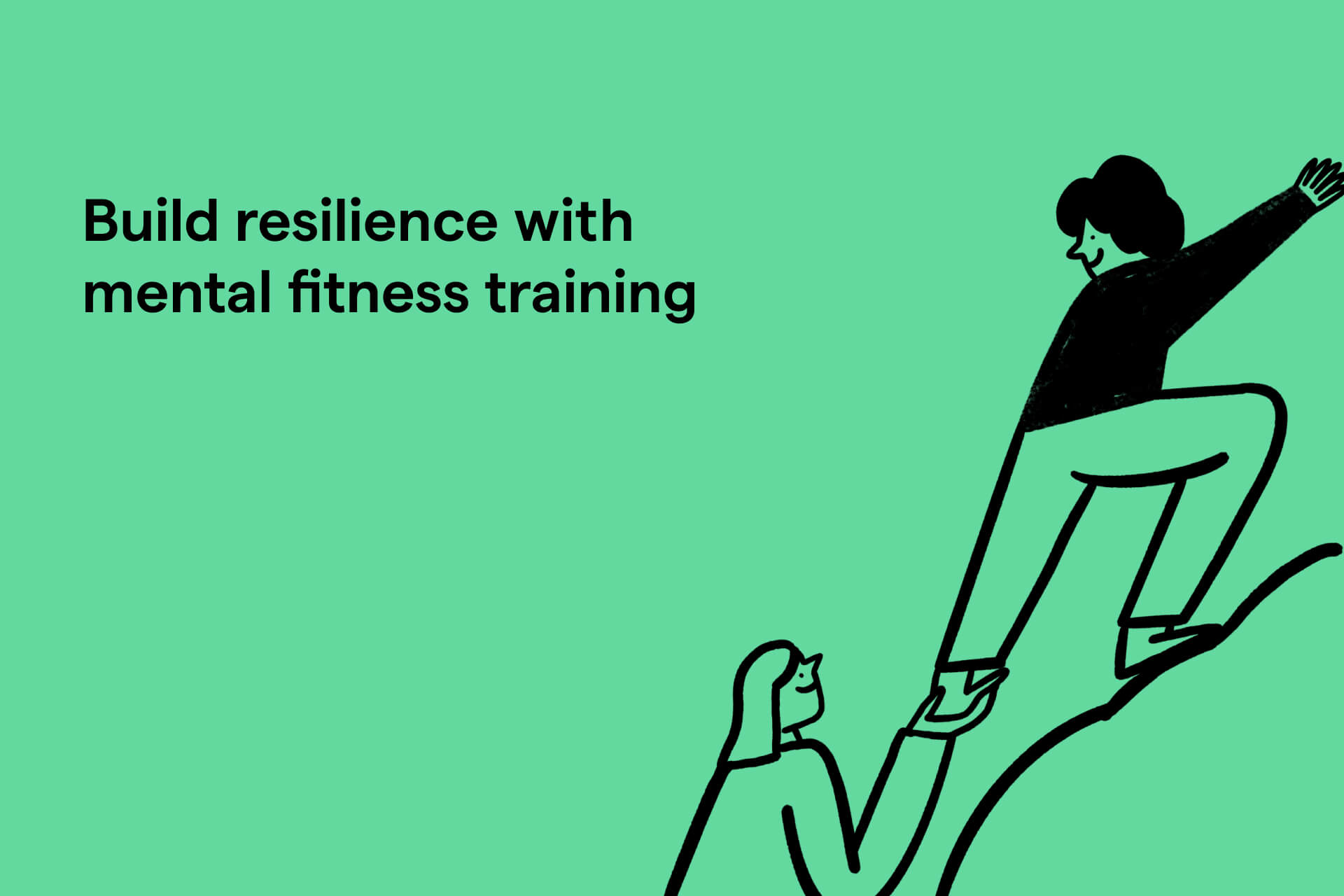
Individual
A self-facilitated program to boost your mental fitness for personal and professional growth
This website will offer limited functionality in this browser. We only support the recent versions of major browsers like Chrome, Firefox, Safari, and Edge.

Select the experience that fits your needs

A self-facilitated program to boost your mental fitness for personal and professional growth

A self-facilitated mental fitness program with exclusive pricing for 2 to 25 individuals

Explore coach-led mental fitness programs with workshops tailored to your organization
Mental Fitness

Resilience enables you to navigate life’s challenges with grace and strength. Your resilience is your ability to bounce back from setbacks, adapt to change, and maintain mental well-being despite adversity. Building resilience is crucial in today’s fast-paced world, where constant stress, uncertainty, and demands can impact mental well-being.
Resilience is your ability to recover from failures or setbacks quickly. Recovery involves shifting from a negative to a positive state of mind as you deal with disappointments and setbacks. When you experience an initial Saboteur reaction (negative mindset), you can shift to a Sage response (positive mindset) much more quickly if you are resilient.
Mental fitness refers to the strength and agility of your mind. Just as you may train your body to be physically fit, you can train your mind to be mentally fit. Mental fitness involves developing skills and habits that enhance emotional intelligence, self-awareness, and self-regulation. Mental fitness is about building the mental muscles you need to thrive in challenging situations.
When you lack mental fitness, you lack resilience; one setback will quickly trigger many more. This snowballing effect, known as Saboteur-spiraling, increases your Saboteur reactions. Setbacks become harder to recover from, leaving you in Saboteur reaction mode for much longer.
The opposite of Saboteur-spiraling is a mental ready state. This neutral stance of your Sage happens when you are at peace and prepared for whatever comes along. You may tell yourself, “I have let go of disappointment over what I did because if I don’t, I’m going to be disappointed with what’s going to happen next.”
Saboteurs are the voices in your head that generate negative emotions in handling life’s everyday challenges. They represent automated patterns in your mind for thinking, feeling, and responding. They cause all of your stress, anxiety, self-doubt, frustration, restlessness, and unhappiness, and they affect your resilience.
Saboteurs cause your negative reaction to setbacks and prolong your recovery time to a positive state.
The master Sabotuer — the Judge — and its accomplice Saboteurs initiate negative reactions to setbacks and prolong your recovery from these reactions. Your Saboteurs go into hyperdrive mode when a setback has occurred, and every negative response makes it more likely you’ll have a subsequent negative reaction.
The Judge of Self
This Judge prolongs your recovery by blaming you for allowing setbacks or your inability to handle them. When you are down, this Judge likes to beat you up so you stay down. The Judge of Self prolongs recovery time by placing blame and criticism. It generates self-doubt, guilt, shame, stress, and deflation, keeping you in an adverse reaction and extending your recovery time.
The Judge of Others
This Judge blames others for setbacks. As a result, your negative emotions towards others put them on the defensive, creating backlash and draining even more of your mental and emotional energy. The Judge of Others generates frustration, distrust, disappointment, and resentment, prolonging your recovery time.
The Judge of Circumstances
The Judge of Circumstances considers setbacks as bad capital. This Judge prolongs your adverse reactions by generating feelings of disappointment, resignation, and stress. It prevents you from generating the Sage perspective that every circumstance can be converted into a gift and opportunity.
The most important way to begin recovering from setbacks is to assume the Sage perspective. The Sage gives you two choices when a setback has occurred: accept or convert.
Accept
Every time negative thoughts or memories of setbacks return, do PQ Reps. A PQ Rep is a 10-second hyper-focus on one of your five senses. This allows you to let go of negative thoughts and shift your mental focus.
Convert
With this option, you use the 5 Sage Powers to shift from negative to positive reactions. In doing so, the Sage perspective helps you trust that every circumstance can eventually be converted into a gift or an opportunity. To begin converting, ask yourself, “What could be the gifts and opportunities? How could I generate the gifts and opportunities?”
All of your Sage Powers and the Sage perspective affect how systematically you can shift from negative to positive reactions, recover faster, and increase your resilience.
When building and maintaining resilience, your ability to quickly shift to a Sage perspective and use the 5 Sage Powers is critical, beginning with the Empathize Power of the Sage.
Empathize (With Self)
Empathizing with yourself is critical for maintaining resilience. Self-compassion when facing a setback recharges the mental and emotional energy drained by the Judge of Self, increasing your recovery time. Empathize helps you feel compassion, caring, understanding, and love for yourself.
Empathize (With Others)
Empathizing with others allows you to see them as fellow imperfect human beings. This will help you recover the mental and emotional energy drained by the Judge of Others, thus shortening your recovery time.
Explore
The essence of Explore is to deeply understand and discover what’s going on before taking action. This Sage Power helps you feel energizing curiosity, fascination, and wonder. Discovery is a positive act and one you should do early on in setback recovery.
Innovate
Once you understand how you or others contribute to setbacks, you can employ the Innovate Sage Power. Ask yourself, “What gifts could I generate here?” Examples include knowledge, power, and creation. This Sage Power helps you feel the energizing joy of innovation.
Navigate
With the Navigate Sage Power, you can ask yourself, “What’s truly important here? What is not as important as it might seem? Looking back at the end of my life, what would still seem significant or important in this situation?” Navigate helps you feel grounded, centered, anchored, and positive.
Activate
Use the Activate Sage Power to ask yourself, “What action will produce the best result here?” Once you determine the gifts and opportunities you can generate, Activate helps you feel fearless, calm, clear-headed, and laser-focused as you take action.
Resilience is not just a trait. It’s a transformative force that shapes our lives. It’s the key to bouncing back from setbacks, navigating life’s unpredictable twists and turns, and emerging stronger than ever. By building resilience, we can not only weather the storms of life but also find the strength to thrive.
To begin increasing your resilience, take the Saboteur Assessment and identify the Saboteurs that are holding you back.
Then, learn more about how the PQ Program for mental fitness can help you and your team build resilience to boost performance and well-being.

